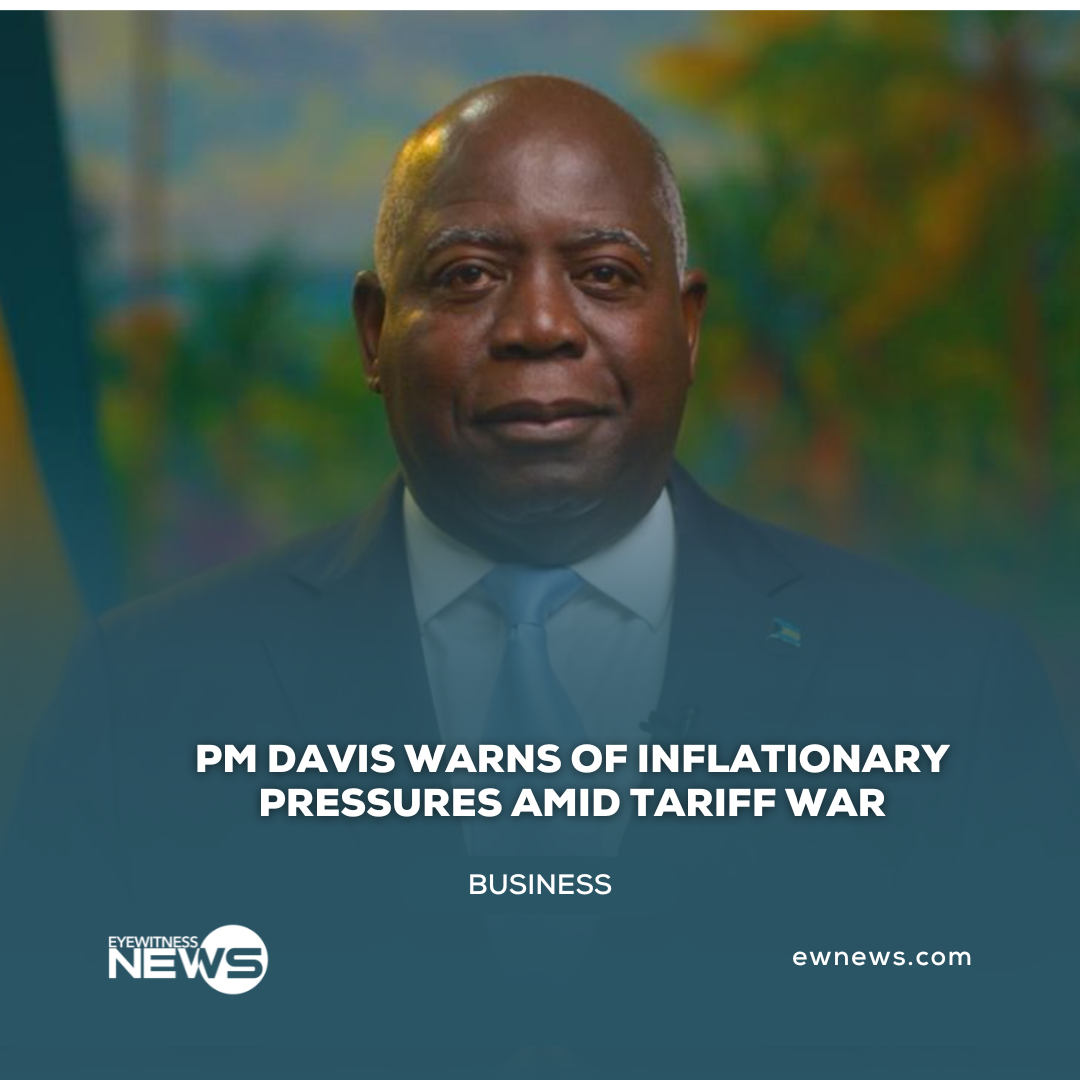NASSAU, BAHAMAS – Prime Minister Philip Davis warned on Wednesday night that the ongoing trade war could lead to higher inflationary pressures, resulting in increased prices for Bahamian consumers, noting, “We are very concerned about the impact on Bahamian families.”
Davis explained: “I want to emphasize that The Bahamas has had a friendly and productive relationship with the United States for many decades. Trade, tourism, investments, cultural exchanges – these are all important aspects of our longstanding relations with our closest neighbor. This is a mutually beneficial relationship, one which will endure. But it’s important to be straightforward with you about how the new tariffs will affect us. The changes – and the turbulence in global markets which has followed – mean we are now facing new and very significant challenges.”
The new tariffs, which came into effect on April 5, impose a 10 percent base rate on goods imported into the U.S. from more than 100 countries, including The Bahamas. U.S. President Donald Trump announced on Wednesday that tariffs for most countries would be paused for 90 days. However, this pause does not apply to China, which has been subjected to 84 percent tariff hikes. As a result, U.S. duties on Chinese goods have been increased to 125 percent, effective immediately.
Davis noted that the government is working with U.S. officials and fellow Caribbean nations to address the stariff situation and support Bahamian exporters. Davis noted: “We are also speaking with Bahamian exporters and working to understand whether there are short-term policies we could enact to cushion the fallout.”
Davis also highlighted the government’s ongoing efforts to diversify trade, stating, “My government has taken trade diversification seriously from the start – which means that for the first time, our country has in place an agency dedicated to expanding trading opportunities, and a national trade policy. Significant efforts to create new trade relationships were already underway, and those efforts will now be intensified.”
He further noted: “The new tariffs are likely to cause new inflationary pressures, which would mean higher prices for Bahamian consumers. For a country like ours, higher prices will add to what is already an unbearably high cost of living. We are very concerned about the impact on Bahamian families.” He also pointed to the cost of electricity as a major contributor to high prices, stating, “One of the key drivers of high prices in The Bahamas, for both families and businesses, has been the cost of electricity, which is why we’ve worked hard to create our country’s first nationwide, comprehensive energy reforms.”
Davis continued: “Much-needed and long overdue upgrades to the electricity grid are underway, and today, in fact, we are signing a number of additional agreements to power our islands with solar energy. I won’t sugarcoat the dangers we are facing right now, due to escalating trade tensions around the world – but I am thankful we will face this new crisis with these crucial price-reducing energy reforms in motion. In addition, the VAT reduction on all food sold in our markets is providing some relief. We understand how hard it is to make ends meet and we will continue to look for opportunities to reduce the burdens of high prices. We will also intensify and speed up our efforts to grow more of what we eat at home.”
He also emphasized the risks posed by a potential slowdown in the U.S. economy, stating: “Another significant risk to The Bahamas is that a slowdown in the U.S. economy will slow our tourism industry. We will be convening industry leaders as we evaluate options for mitigating the risks we face, if the new tariffs are not significantly unchanged as U.S. policy evolves next.”
China contends that its economic and trade relations with the United States have been mutually beneficial, with significant contributions to global stability. Since the establishment of diplomatic relations in 1979, trade between the two nations has grown from under $2.5 billion to nearly $688.3 billion in 2024. Despite this growth, China says that the rise of unilateralism and protectionism in the US, particularly since 2018, has disrupted the positive trajectory of bilateral relations. The US has imposed tariffs on more than $500 billion of Chinese exports, prompting China to take countermeasures to defend its interests. However, China remains committed to resolving issues through dialogue and has made efforts to honor agreements, such as the Phase One Economic and Trade Agreement, despite challenges like the global pandemic and supply chain disruptions.
Chinese Foreign Ministry spokesperson Lin Jian stated on Wednesday, “We will not let anyone take away the Chinese people’s legitimate right to development. We will not tolerate any attempt to harm China’s sovereignty, security, and development interests. We will continue to take resolute and strong measures to safeguard our legitimate rights and interests.” Lin Jian further remarked, “The U.S. is still abusing tariffs and exerting maximum pressure on China. China firmly rejects and will never accept such hegemonic and bullying moves. If the U.S. truly wants to settle the issue through dialogue and negotiation, it should let people see that they’re ready to treat others with equality, respect, and mutual benefit. If the U.S. decides not to care about the interests of the U.S. itself, China, and the rest of the world, and is determined to fight a tariff and trade war, China’s response will continue to the end.”






